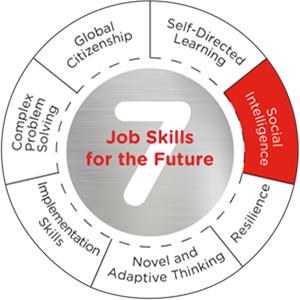7.2 What Sets You Apart?

Fanshawe College has identified Job Skills for the Future that all programs in the college embed into their curriculum. These Job Skills are generic to all industries. Competence in these job skills is regarded as required for those seeking to build successful careers. It is important that soon-to-be-graduated students can identify these skills in themselves and understand how they can exhibit competence in these skills when meeting with potential employers. Of the Job Skills for the Future, Social Intelligence is highlighted in this OER.
Social Intelligence

Build and nurture mutually beneficial relationships.
Social Intelligence is being able to interact positively with others, building strong healthy relationships and thriving in social environments. It is having the self-awareness to effectively apply the knowledge of social dynamics and team building to create positive outcomes for everyone involved. Individuals who demonstrate the skill of Social Intelligence have excellent communication skills and are empathic. We often refer to Social Intelligence as ‘people skills’ or ‘interpersonal skills’.
Excelling in Social Intelligence as a Job Skill means:
You:
- Have a passion for working with others towards positive outcomes
- Are curious about the world and the people in it
- Care about others
- Have good emotional control (Emotional Intelligence)
- Listen with intent and exhibit strong conversational skills
Others see you as:
- Having respect for diverse opinions, values, belief systems and the contributions of others
- Having a constantly renewed sense of curiosity and wonder
- Having a willingness towards helping others
- A good listener and communicator
Have you heard the phrase “job competition”? The word “competition” isn’t used by accident. Almost every job is filled following a competition between job candidates. Have you reflected on what sets you apart from the other candidates in this competition? An excellent way to build your professional reputation, obtain references, set yourself apart from the competition, refine your career goals, and build long-term networks is by gaining practical experience, especially if you have limited networks to begin with. Each of these opportunities will provide you with a solid network of contacts and valuable industry advice even before you start searching for your career.
Upskilling with micro-credentials: Have you heard of the term micro-credential? According to eCampus Ontario, “ A micro-credential is a certification of assessed learning associated with a specific and relevant skill or competency. Micro-credentials enable rapid retraining and augment traditional education through pathways into regular postsecondary programming.”[1] You will find that micro-credentials are laser focused, shorter in duration than traditional courses, often available online and some offer badges of completion which may be stackable to attain a further level of achievement.
Part-time and summer employment:Employers are looking past the knowledge and skills you’ve gained in school, they are interested in seeing that you have obtained real-world experience. Securing a summer or part-time job while completing your studies will demonstrate to the employer that you have developed the employment readiness skills they are looking for. Gaining experience in different interest areas will also help to solidify your career goals and expand your connections.
Job shadowing:Job shadowing is an opportunity for you to observe working professionals in their environment throughout their typical workday or week. This allows you to process information about an occupation and clarify your job goal. You are able to see hands-on how your learned skills translate into a particular work environment and job. To inquire about job shadowing opportunities, reach out to people in your network or contact companies of interest.
Volunteer opportunities:Volunteering your time allows you to directly impact your community, meet new people, learn new valuable skills, advance your career, and increase your confidence. Additionally, volunteering introduces you to different environments and roles within an organization that will help you identify your interests within the field. You have the chance to cultivate valuable leadership opportunities through rewarding experiences. If you are interested in volunteering, visit the Volunteer Centre, contact specific companies of interest, search their websites, or connect with community volunteer organizations like Volunteer London.
Mentorship: Lastly, a good way to gain quality advice and industry know-how is by finding yourself a mentor. A mentor is someone who willingly shares their skills, knowledge, expertise, advice, and professional contacts with you throughout your career journey. A mentor can assist you in setting realistic career goals and making smart career decisions. Their wisdom can be beneficial, from finding a job after you graduate to moving up the company ladder. You can look within your current network for a mentor; this could be a professor, work or volunteer supervisor, or a family friend. If no one in your immediate network is in a position or industry that might interest you, research professionals on LinkedIn, reach out to your Alumni and Friends Network, or ask for referrals and contact them directly.
“4.5 Social Intelligence” from Working in Play: Planning for a Career in the Recreation and Leisure Industry in Canada by Linda Whitehead, BA, M Ed, MBA is licensed under a Creative Commons Attribution-NonCommercial-ShareAlike 4.0 International License, except where otherwise noted.
- eCampusOntario. (n.d.). Why Micro-credentials Matter. https://micro.ecampusontario.ca/ ↵


